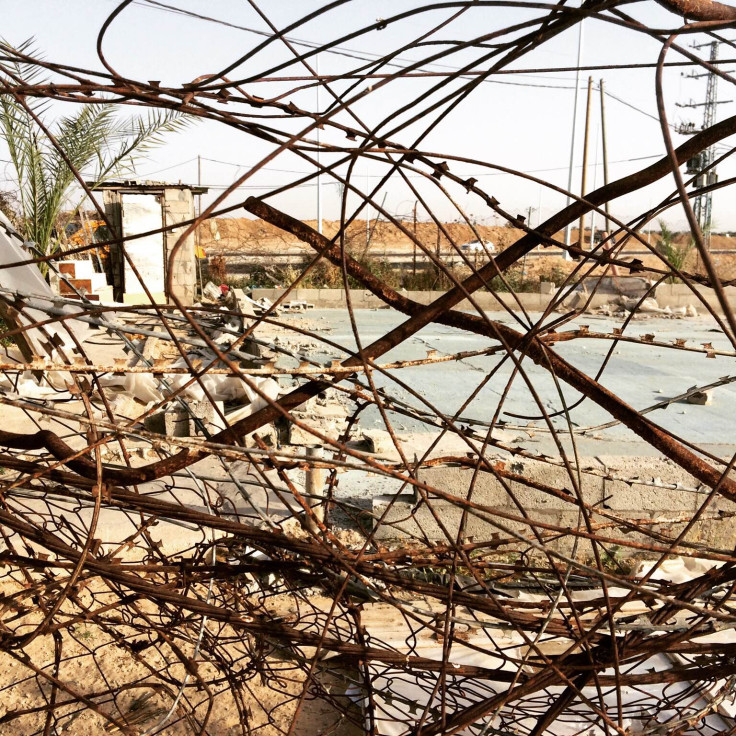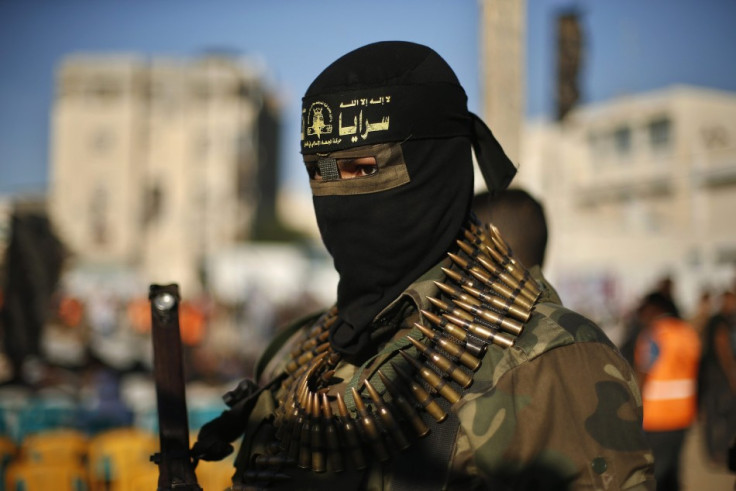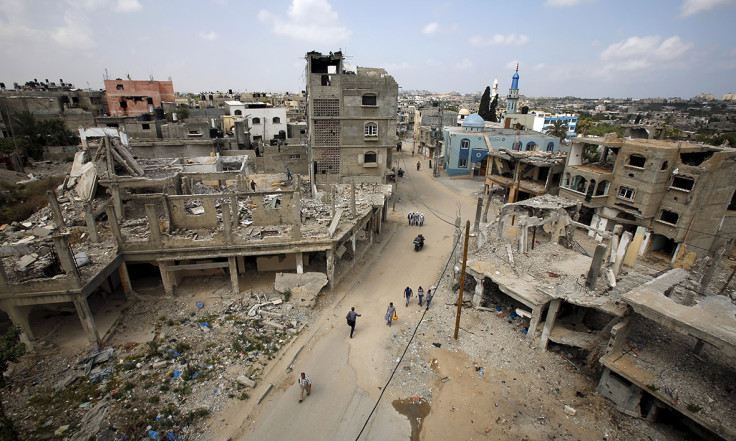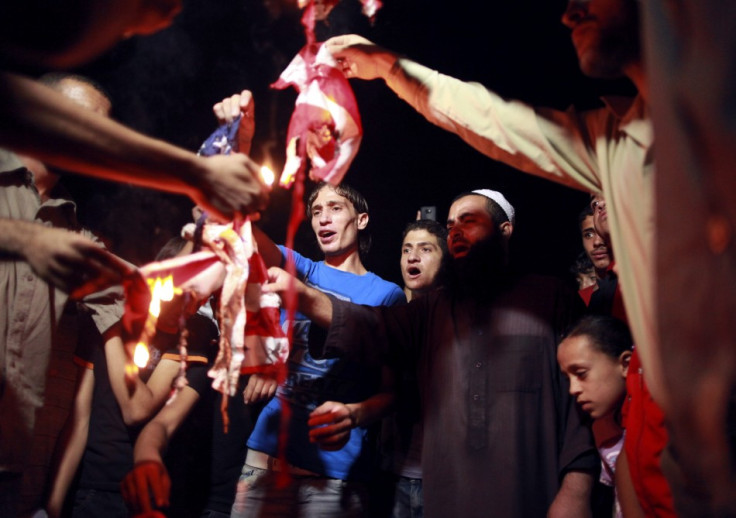Gaza's next war: Will Isis-inspired Salafi jihadis overthrow Hamas?

At a checkpoint in Deir el-Balah in Gaza, a Hamas policeman stands in dark blue uniform amidst a landscape of destroyed buildings and dried up fields. Nearby is pile of plastic, concrete and broken wood, the remains of a mosque that has since been torn down.
It was here that until a week ago radical Salafist Palestinians who idolise Islamic State (Isis) and have been accused of a series of bomb attacks gathered. Hamas, the Islamist group that have controlled Gaza since 2007, destroyed the makeshift mosque on 3 May.
But the Gaza Strip's problem with radical Islam neither began, nor ended, in this dusty patch of land off Salahaddin Road.
Domestic tensions have reached boiling point, with Hamas-led security forces claiming to have thwarted a roadside bomb attack on a busy central street said to be an attempt by ultra-radical Salafist supporters of IS.
The bomb had a timer on it and there was a getaway car waiting for him
Hamas claims the group aimed to detonate the 30kg bomb on a busy intersection next to the main market in Gaza City's Shejaiya neighbourhood, heavily damaged during the 2014 war with Israel, and was stopped with just minutes to spare.
"The bomb had a timer on it and there was a getaway car waiting for him," said Hamas spokesman Fawzi Barhoum. Two men were arrested but Barhoum would not name them.
The latest incident comes after an escalation in attacks by the Salafists and a concerted effort by Hamas to clamp down on them. The Islamist party – which seized control of the Strip in 2007 – believes the Salafi groups are destabilising its power base and have set up dozens of new security checkpoints across the Gaza Strip.
In April, Hamas-led security forces arrested prominent Salafist activist Sheikh Adnan Mayt and carried out raids of other homes.

The arrests were followed by two roadside bomb blasts including one near the general prosecutor's office of the United Nations Relief and Works Agency for Palestine refugees (UNRWA). Another was carried out the next day near the Abu Mazen roundabout in western Gaza. Salafist movement official Abu al-Ayna al-Ansari has denied his group was behind the bombings.
Hamas has also begun cracking down on the mosques used by the Salafi groups in Gaza. In early May, the security services attacked a makeshift mosque in Deir el-Balah. They returned to demolish the mosque – which was little more than a plastic greenhouse-type structure – on 3 May.
The issue is extremely sensitive in Gaza and when IBTimes UK visited the remains of the mosque – now surrounded by barbed wire – police and Hamas fighters ordered we delete photographs. Reporters San Frontieres has reported widespread allegations of physical assault and detention of Palestinian journalists who try to cover various events in the strip.
'Hamas has made the decision not to crush them and has said they can be reasoned with. Hamas does not want to start a bloody clash with them.'
The day after the makeshift mosque was flattened, a radical Salafist group known as Ansar al-Dawla al-Islamiya – the supporters of the Islamic State – issued a 72-hour ultimatum to Hamas calling for the release Salafists detainees.
This was followed by a bomb going off outside the security headquarters in Gaza City, while days later the group shelled a compound of Hamas' military wing Al-Qassam in Khan Younis. Sources say Hamas has arrested more than 200 Salafi following the bombings but the Islamist group claimed the figure was closer to 30.

Until 2015, tensions between Hamas and the group have been quiet. The last major attack was in 2009 when security services entered Ibn Taymiyyah mosque killing Sheikh Abdel Latif Moussa and 29 followers.
Today, the radical-Salafis are Hamas's weak spot and according to Israel's commander of forces outside Gaza, Major-General Sami Turgeman, Israel and Hamas share common interests and they must stay in power to prevent the enclave descending into chaos.
In September 2014, Israeli Prime Minister Benjamin Netanyahu said IS and Hamas are "branches of the same poisonous tree" when he talked about the war between Israel and Hamas.
In January, Hamas allowed a rare rally by the radical Salafist groups in support of IS and the deadly attacks by three Islamist gunmen in France.
The demonstration was held five days after Charlie Hebdo's survivors' issue featured a cartoon of the Prophet Mohammed on the cover after two gunmen burst into the French satirical weekly's Paris office and shot dead 12 people.
What is Salafism?

Ever since the takeover of Gaza by Hamas in 2007, the Strip has been synonymous with radical Islam.
But the Salafi movement makes Hamas, itself an Islamist group, look moderate. It rose to prominence in 2011, when a Salafist group kidnapped and murdered an Italian peace campaigner, Vittorio Arrigoni, in an extremely rare attack on foreigners in Gaza.
Salafi translates as 'as-salaf-as-saliheen' and venerates the first three generations of Muslims after Mohammed's death in the 6th century.
As such, the movement is defined by an extremely conservative and puritanical attitude towards politics and social issues.
In Egypt, it was the Salafis whoi attacked Coptic Christian churches, campaigned against alcohol being sold in Christian shops and pushed for laws that curtailed the rights of women.
The Salafi movement presents a threat to Hamas, which has always used its Islamic credentials to attract support from Palestinians in both Gaza and the West Bank.
Hamas, weakened after the 2014 war with Israel and increasingly unpopular in the Strip, now fears Palestinians will shun it in favour of the Salafis.
(Pic: Reuters)
The radical Salafis carrying out attacks have attempted to draw links between themselves and IS, who still control large parts of Syria and Iraq. The group has not sworn allegiance formally to the Islamic group, nor has IS declared its presence in the coastal enclave.
There are plenty in Gaza who see the Hamas crackdown on Salafists as overblown. Gaza-based political analyst Mukhaimer Abu Saada said he did not believe the car bombing that Hamas claimed to have thwarted was set to be carried out.
"Since this tension has escalated, the Salafists have not killed anyone and have not gone after any Palestinian," he said.
"At the end of the day I believe they need an Islamic Fatwa [an Islamic legal pronouncement] to use suicide bombers or to go after Hamas or other civilians."
As for the allegiance of the Salafi groups, Abu Saada said they were likely to want to eventually follow IS's lead.
"It's almost a year ago since Isis took control of Mosul in Iraq in early June 2014 and Abu Bakr al-Baghdadi declared himself the Islamic caliphate of the Islamic State. That has been seen by many Salafists in Gaza as their ultimate dream," he said.
As for Hamas, it knows that not only does it outnumber the Salafi – the Islamists has approximately 15,000 Al-Qassam fighters and 25,000 security police and internal security while it is believed the Salafists only have 2,000 fighters – but that a civil war would help nobody.
Abu Saada said: "Hamas has made the decision not to crush them and has said they can be reasoned with. Hamas does not want to start a bloody clash with them."
Hamas spokesman Fawzi Barhoum did believe things would get worse unless they received more funding and support.
Held in Gaza: IBTimes UK's Kate Shuttleworth explains how she fell foul of the Hamas security services.
As we pulled into a side road off Salah al-Din Road in Deir el-Balah, I thought that the site of the Salafi mosque was so nondescript it bordered on boring. Piles of wood lay among bits of plastic and other material behind barbed wire.
As I began to take pictures, a Hamas police officer walked over and asked what we were doing. Seeing the camera he called for back-up and within 30 seconds two trucks with six armed Al Qassem fighters roared around the corner, boxing us in.
They demanded any photos of the remnants of the mosque be deleted and said they wanted the memory card from a camera to take back to their headquarters to delete and later return. We followed them back to the building, where four armed Hamas fighters guarded us as my camera was taken to various offices in the building.
The commander told me he wanted to keep the memory card from my camera and that he would transfer photos that he deemed acceptable on to another card. He wanted me to hand over my mobile phone but I refused as they already had my camera.
They gave me the new card and agreed to allow me to keep photos from an earlier story and then bizarrely one of the heavily armed fighters asked to have his photograph taken with me. I was intimidated but reluctantly consented to avoid escalating the situation.
The Hamas commander told us that he wanted the Salafi story "buried" as it made Hamas look unstable and was an opportunity for Palestinians in Gaza to blame the government further for the problems facing the coastal enclave rather than Israel. He also said it was a "non-story".
In many ways I was lucky. The commander, who refused to give his name, admitted Palestinian journalists reporting the story have been interrogated and there are widespread reports that a number of local reporters have been detained by the authorities.
© Copyright IBTimes 2025. All rights reserved.






















